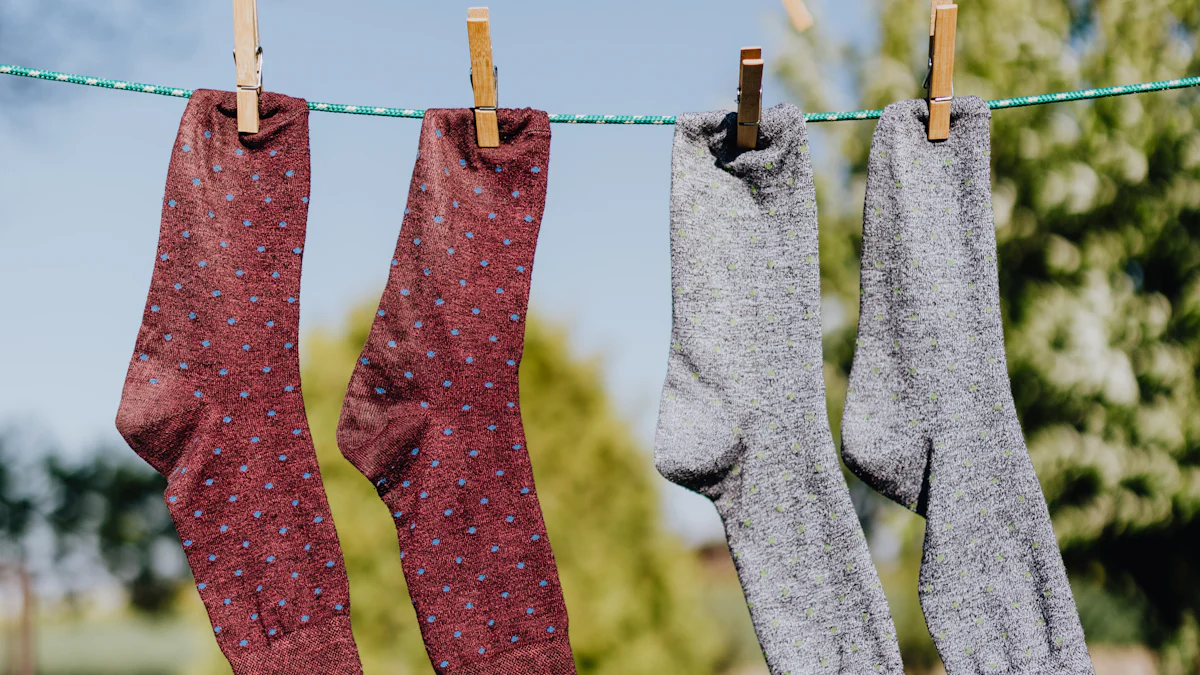
Choosing the right cotton wool socks is crucial for sensitive skin. Regular socks often contain synthetic materials that can cause irritation. Cotton wool socks made from organic cotton and wool are better choices. They are free from harmful chemicals and are hypoallergenic. Organic cotton is breathable and comfortable, reducing sweat buildup. Wool, especially Merino wool, wicks moisture and naturally regulates temperature. Both materials feel gentle on the skin, making them perfect for sensitive individuals. Opting for cotton wool socks made from organic materials can enhance comfort and improve skin health.
Benefits of Organic Cotton and Wool Socks
Organic Cotton
Hypoallergenic Properties
Organic cotton socks are great for sensitive skin. They don’t cause allergies, unlike regular socks with synthetic materials. Organic cotton has no harmful chemicals. This makes it safer for people with allergies or sensitive skin.
Breathability and Comfort
Organic cotton socks let air flow through. This keeps feet dry and less sweaty, which stops bad smells. They also feel soft on the skin, making them comfy to wear every day.
Wool
Natural Moisture-Wicking
Wool socks, especially Merino wool ones, keep feet dry by soaking up moisture. This helps stop blisters and keeps feet comfy. They’re perfect for active people who hike or run.
Temperature Regulation
Wool socks keep feet warm in winter and cool in summer. This makes them good for all seasons. They help you stay comfortable whether it’s hot or cold outside.
Top Organic Cotton Socks for Sensitive Skin

Brand A
Key Features
Pact’s No-Show Socks are made from high-quality materials. They use 82% organic cotton. These socks are comfy and eco-friendly. The no-show style is great for casual wear. The seamless toe stops irritation.
Pros and Cons
Pros:
- Lots of organic cotton
- Seamless toe
- Good for daily use
Cons:
- Few style choices
- Costs a bit more
Brand B
Key Features
Harvest & Mill makes socks with 100% USA-grown organic cotton. They don’t use dyes, so the color is natural. You can get them in ankle or crew styles. They are simple and reliable.
Pros and Cons
Pros:
- All organic cotton
- No dyes
- Different styles available
Cons:
- Few color choices
- No extra features like cushioning
Brand C
Key Features
Maggie’s Organics offers durable and comfy socks. They use eco-friendly methods to make them. The socks come in many sizes and colors. The fine rib design looks nice.
Pros and Cons
Pros:
- Strong and comfy
- Made in an eco-friendly way
- Many sizes and colors
Cons:
- Not as soft as some other brands
- More expensive than non-organic socks
Top Wool Socks for Sensitive Skin

Brand D
Key Features
Darn Tough Merino Wool Socks are very strong and comfy. They use soft Merino wool, which feels nice on the skin. The seamless design stops irritation, making them great for sensitive skin. These socks also have strong heels and toes.
Pros and Cons
Pros:
- Soft Merino wool
- Seamless design
- Strong heels and toes
Cons:
- Costs more
- Few color choices
Brand E
Key Features
Smartwool Hike Light Cushion Socks wick moisture well. Made from Merino wool, they keep feet dry during outdoor fun. The light cushion gives support without being bulky. The flat toe seam stops irritation.
Pros and Cons
Pros:
- Wicks moisture well
- Light cushion
- Flat toe seam
Cons:
- Not as strong as other brands
- Few style choices
Brand F
Key Features
Icebreaker Merino Wool Socks help control temperature. They use a mix of Merino wool and nylon for strength. The seamless toe stops chafing. Merino wool keeps feet fresh all day.
Pros and Cons
Pros:
- Controls temperature
- Seamless toe
- Keeps feet fresh
Cons:
- Costs more
- May shrink if washed wrong
How to Pick the Right Socks for Sensitive Skin
Material Choices
Organic Cotton vs. Wool
Choosing between organic cotton and wool depends on what you need. Organic cotton socks are breathable and comfy. They are great for daily wear, especially in warm weather. These socks don’t cause allergies because they have no harmful chemicals.
Wool socks, like those made from Merino wool, keep feet dry by soaking up moisture. They are good for physical activities. Wool also keeps feet warm or cool depending on the weather. This makes them perfect for hiking and running.
Fit and Comfort
Sizing Tips
Getting the right size is important for comfort. Always check the size chart from the maker. Measure your foot length and width carefully to pick the right size. Socks that don’t fit well can hurt your feet.
Think about how stretchy the socks are. Organic cotton socks fit snugly, while wool socks might stretch more. Different brands may have different sizes, so try them on if you can.
Extra Features
Seamless Design
Seamless socks feel better on sensitive skin because they reduce friction and stop blisters. Look for seamless toes to avoid irritation.
Cushioning and Support
Cushioning makes socks more comfortable by adding support and reducing impact on your feet. Cushioned soles are good if you stand or walk a lot. Some brands add extra cushioning in high-impact areas like heels and balls of the feet.
Organic cotton and wool socks are great for sensitive skin. They don’t cause allergies, let air flow, soak up sweat, and keep feet warm or cool. Some top brands are Pact, Harvest & Mill, Maggie’s Organics, Darn Tough, Smartwool, and Icebreaker. Each brand has special features for different needs. To pick the best socks, think about the material, how they fit, and extra things like seamless toes and padding. Trying different ones helps you find the right pair. Good socks make your feet comfy and healthy. They are worth buying.
See Also
Discovering the Range of Socks for Males and Females

